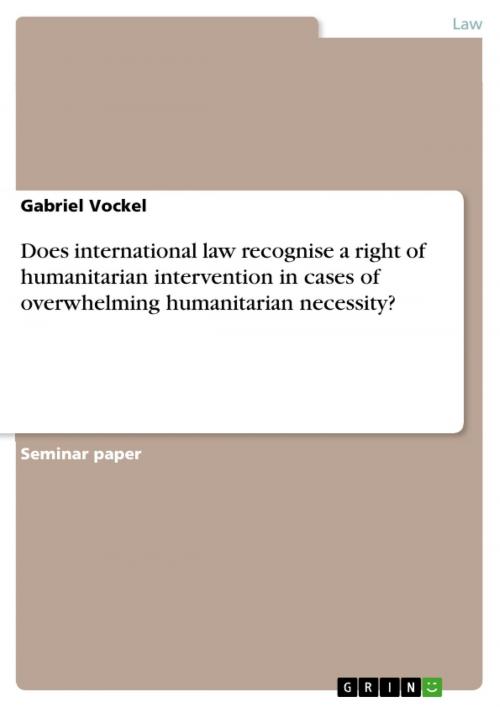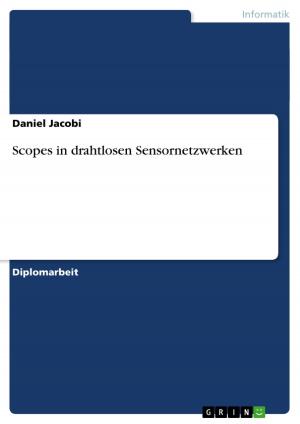Does international law recognise a right of humanitarian intervention in cases of overwhelming humanitarian necessity?
Nonfiction, Reference & Language, Law, International| Author: | Gabriel Vockel | ISBN: | 9783638588904 |
| Publisher: | GRIN Verlag | Publication: | January 7, 2007 |
| Imprint: | GRIN Verlag | Language: | English |
| Author: | Gabriel Vockel |
| ISBN: | 9783638588904 |
| Publisher: | GRIN Verlag |
| Publication: | January 7, 2007 |
| Imprint: | GRIN Verlag |
| Language: | English |
Seminar paper from the year 2005 in the subject Law - Comparative Legal Systems, Comparative Law, grade: Distinction, Coventry University (Coventry Business School), course: International Law in the Contemporary World Arena, 49 entries in the bibliography, language: English, abstract: The dilemma of what to do about citizens of another sovereign country who see themselves confronted with horrifying abuses by their own government has remained with us throughout the era post World War II. The recent events in the Sudanese region of Darfur, labelled not only civil war, but 'ethnic cleansing' have, again, triggered discussions about the question of 'humanitarian intervention'. We can quote various instances in recent history after 1945, where appalling violations of basic human rights, including the mass killing of civilians on a high scale happened within the sovereign territory of a country, for example in Cambodia in the period 1975-1979, in Ex-Yugoslavia in the early 1990s, in Rwanda in 1994, to name but these.3Time and again, alongside those tragic events, different voices have called for military actions driven by humanitarian considerations, seemingly subscribing to the catchphrase 'humanitarian intervention [as opposed to] inhumanitarian non-intervention'. The military actions of NATO in Kosovo especially, having been branded the first 'humanitarian war', have attained a remarkable degree of attention in the academia, raising new and old questions about the legitimacy and viability of the model of humanitarian intervention. While there seems to be an unanimous agreement that there are in existence both moral and ethical raisons d'être as well as some agreement of how the modus operandi of a humanitarian intervention should look like10, there exists some substantial disagreement as to if at all and under which conditions such a venture is to be deemed legally permissible. In the face of an absence of a comprehensive legalistic framework under international law that would govern humanitarian interventions (the human rights framework is severely limited by the weaknesses of its enforcement mechanisms), the essence of the contemporary debate predominantly stems from a clash of imperatives between the principles of the protection of state sovereignty as laid down in Art. 2 (4) and (7) of the UN-Charter and the obligation of the protection of human rights (that might be achieved through a humanitarian intervention), in other words, a 'conflict between justice and [legal] order'.
Seminar paper from the year 2005 in the subject Law - Comparative Legal Systems, Comparative Law, grade: Distinction, Coventry University (Coventry Business School), course: International Law in the Contemporary World Arena, 49 entries in the bibliography, language: English, abstract: The dilemma of what to do about citizens of another sovereign country who see themselves confronted with horrifying abuses by their own government has remained with us throughout the era post World War II. The recent events in the Sudanese region of Darfur, labelled not only civil war, but 'ethnic cleansing' have, again, triggered discussions about the question of 'humanitarian intervention'. We can quote various instances in recent history after 1945, where appalling violations of basic human rights, including the mass killing of civilians on a high scale happened within the sovereign territory of a country, for example in Cambodia in the period 1975-1979, in Ex-Yugoslavia in the early 1990s, in Rwanda in 1994, to name but these.3Time and again, alongside those tragic events, different voices have called for military actions driven by humanitarian considerations, seemingly subscribing to the catchphrase 'humanitarian intervention [as opposed to] inhumanitarian non-intervention'. The military actions of NATO in Kosovo especially, having been branded the first 'humanitarian war', have attained a remarkable degree of attention in the academia, raising new and old questions about the legitimacy and viability of the model of humanitarian intervention. While there seems to be an unanimous agreement that there are in existence both moral and ethical raisons d'être as well as some agreement of how the modus operandi of a humanitarian intervention should look like10, there exists some substantial disagreement as to if at all and under which conditions such a venture is to be deemed legally permissible. In the face of an absence of a comprehensive legalistic framework under international law that would govern humanitarian interventions (the human rights framework is severely limited by the weaknesses of its enforcement mechanisms), the essence of the contemporary debate predominantly stems from a clash of imperatives between the principles of the protection of state sovereignty as laid down in Art. 2 (4) and (7) of the UN-Charter and the obligation of the protection of human rights (that might be achieved through a humanitarian intervention), in other words, a 'conflict between justice and [legal] order'.















